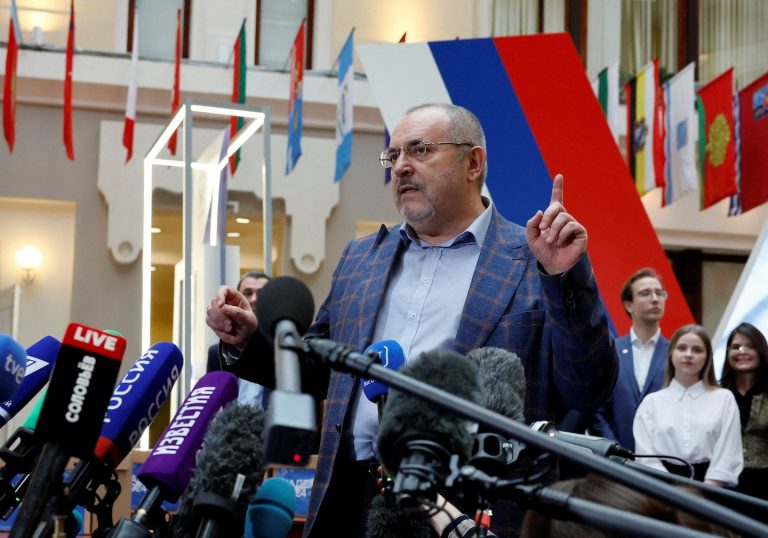Russian authorities have long manipulated the election, banning any candidate who poses a threat to President Vladimir Putin — such as jailed opposition leader Alexei Navalny — and allowing only a carefully selected clique of candidates who cooperate with the regime to be accepted.
But even the veneer of legitimacy sought by Russian authorities could be tainted by the exclusion of Nadezhdin, 60, a physicist and anti-war politician who is widely seen as posing no realistic threat to Putin.
Opponents of the war in Ukraine have seized on Nadezhdin's candidacy as an opportunity to express their anti-war sentiments without the risk of arrest, by supporting his efforts to win a place on the ballot. Tens of thousands of people lined up in the cold at locations across Russia to submit their signatures in support of his registration, a stunning repudiation of the war that has come to define Putin's presidency.
Preventing Nadezhdin from voting would signal the Kremlin's wariness of any means for Russians to express their opposition to the increasingly unpopular war.
In December, authorities barred another anti-war candidate, former TV journalist Yekaterina Dontsova, from running in the elections, after the signatures she submitted for registration were rejected.
Under Russian election law, a candidate must collect more than 100,000 signatures across Russia to qualify. Nadezhdin raised 180,000 and gave 105,000, his campaign said.
After an initial review of 60,000 signatures, the Electoral Commission working group rejected 9,209, or more than 15 percent. To qualify, no more than 5 percent of signatures can be invalidated.
Kremlin analysts and critics said the rejection of signatures suggested Nadezhdin would almost certainly be barred from running. Such a blatant violation of democratic norms would signal Russia's transformation into a repressive state, where dissent is crushed, Putin's critics are labeled “terrorists” and imprisoned, and the media is under state control.
On Monday, Nadezhdin vowed to respond, with his staff having to sift through the action group's complaint to prove the authenticity of at least 4,500 signatures. Igor Artemyev, deputy head of Nadezhdin's campaign headquarters, said staff would face “two sleepless nights” as they tried to prepare their legal response.
Nadezhdin said that if his candidacy is rejected on Wednesday, he will appeal the decision to Russia's Supreme Court. However, the chances of this succeeding appear slim given Russia's highly politicized judicial system.
Many members of Russia's divided opposition have publicly expressed doubts about Nadezhdin's candidacy, and some suspect that he was a pawn of the Kremlin — ordered to run to provide the appearance of legitimacy. But the move to ban him seems to refute those allegations.
Nadezhdin has strongly denied such assertions. “Putin looks at the world through the prism of the past and is dragging Russia into the past,” Nadezhdin wrote in an election statement explaining his opposition to Putin’s policies. “The country is increasingly sliding into feudalism and medieval obscurantism.”
Abbas Galliamov, a political analyst and former Putin speechwriter based in Israel, said it was clear the Kremlin had decided to block Nadezhdin, even though doing so would undermine any claim of legitimate elections.
“It is clear that if Nadenedin is not allowed to run, this legitimacy will be completely forgotten, and the president himself has said that this is the main goal of the campaign,” Galliamov told Echo of Moscow Radio.
Ivan Zhdanov, director of Navalny's anti-corruption foundation, rejected the working group's assertions that more than 9,000 signatures were invalid.
“So he will be refused registration as a candidate on Wednesday and that is a fact. But it is important to remember that Nadezhdin, of course, collected real signatures.” “It's just that the Kremlin decided not to let him in.”
Zhdanov said that the decision is further evidence of election fraud.
“Just as Nadezhdin will not be registered, it is also clear that the votes will be stolen,” Zhdanov said, calling on Russians to support any protest against the war and the regime.
Voting in the presidential election will take place over three days in March, with a mysterious electronic voting system expected to play a major role for the first time in presidential voting.
Both sides facilitate potential fraud, according to critics. The independent election monitoring group, Golos, has been labeled a “foreign agent,” and its president, Grigory Melkonyants, and coordinator, Vladimir Egorov, have been accused of organizing an “undesirable organization.”
Nadezhdin's rating among voters is low, according to Lev Gudkov, director of the Levada Center, an independent polling group. While Putin's approval rating stands at 85 percent, according to the group's Jan. 2-31 poll, Gudkov told independent media outlet Ezhnestvo that the poll showed Nadezhdin would likely win a maximum of 4 percent of the vote if allowed to run.
Abakumova reported from Riga, Latvia.

